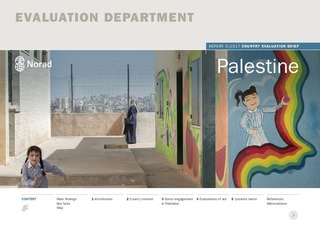Country Evaluation Brief: Palestine
Research report
Permanent lenke
http://hdl.handle.net/11250/2475389Utgivelsesdato
2017-01-01Metadata
Vis full innførselSamlinger
- Publications [1488]
Originalversjon
Country Evaluation Brief, PalestineSammendrag
The Occupied Palestinian Territories is one of the world’s most aid-dependent countries. Despite overall levels of aid falling since 2009, the Territories remain one of the world’s largest per capita recipients of foreign aid. The purpose of this Country Evaluation Brief is to present relevant knowledge about donors’ development efforts in Palestine. The brief systematises relevant findings from existing evaluations of development interventions in the country. The main findings are: Despite some limited successes, multiple constraints made it impossible to meet the stated objectives (lasting peace, effective and accountable Palestinian institutions, and sustainable socio-economic development) of international aid to the occupied Palestinian Territories (oPT) in the period under review (2010–16). The current cooperation and international aid paradigm has reached its limits in the absence of a parallel constructive political track that addresses the key constraints of Israeli occupation, settlement policies and the political division of the West Bank and Gaza Strip. Continued Israeli military occupation in the West Bank and Gaza Strip remains the primary reason for the failure of international aid to achieve goals related to peace, human development and economic prosperity. The Palestinian Authority (PA) adopted donor-driven security sector reform (SSR) as the lynchpin of its post-2007 state-building project. The development process became highly securitized as nearly one third of the aid was allocated to the security sector. Due to the absence of effective accountability mechanisms in the international aid framework for Palestine, donors are not committed to the principles of aid effectiveness (Paris, Accra and Busan declarations) and the Do No Harm principles. Aid fatigue in the oPT is acknowledged in the donor community, but most donors are unwilling to revise the overall aid system or alter the economic framew
